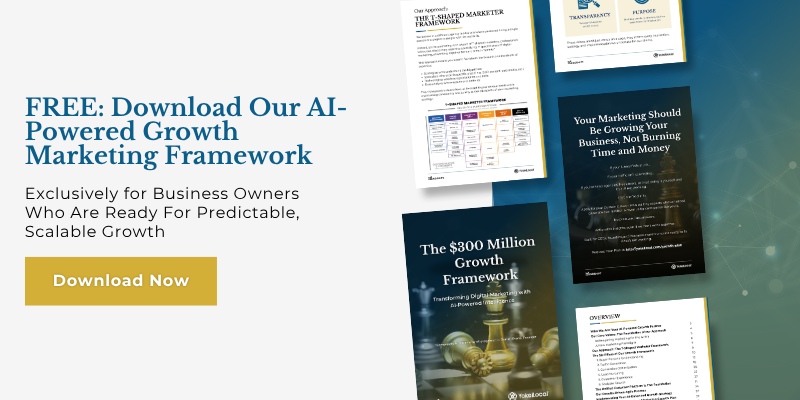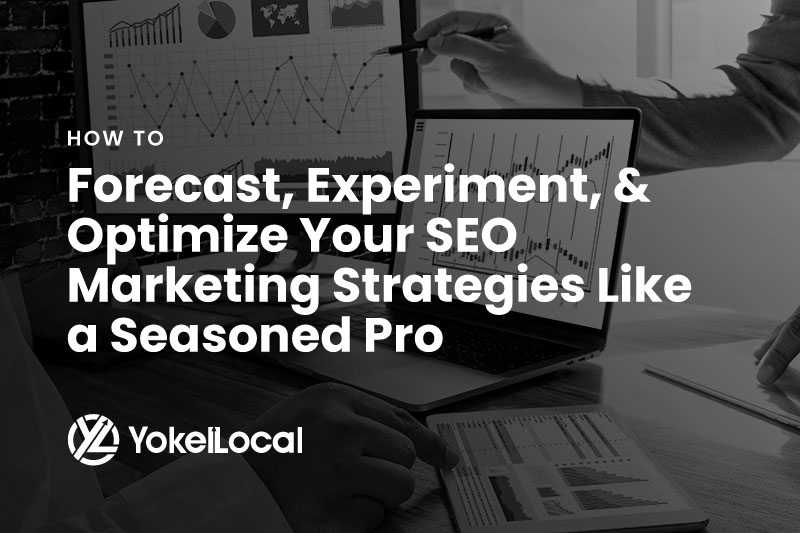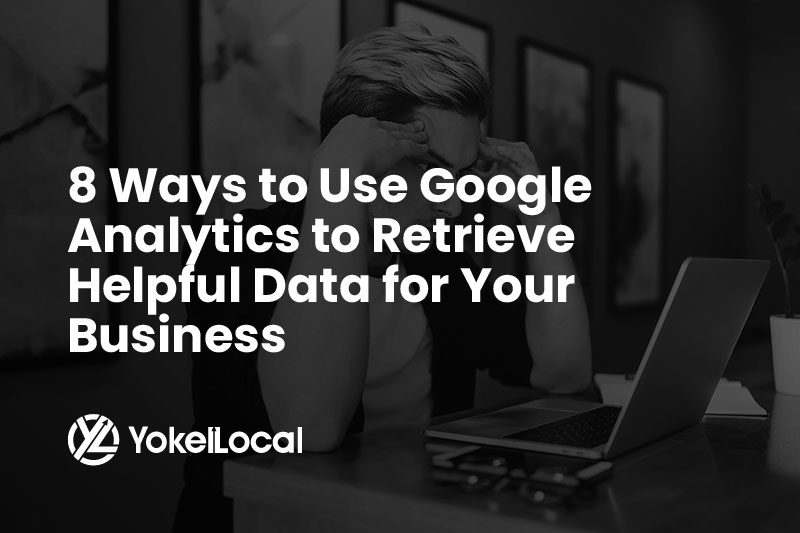Data-driven marketing is the foundation of today’s advertising strategies and is a requirement if you want to deliver the personalized experience consumers are demanding. What does it mean for your business and how can you take advantage of it? Take a look at how it can benefit your organization and ways you can implement it in your own campaigns.
Why Is Data-Driven Marketing Important?
Data-driven marketing provides concrete insight into how well or not your marketing activities are working. Marketers today need data for everything from client presentations to reports for company leadership.
Here are a few reasons why data-driven marketing is important:
1. Data-Driven Marketing Helps You Reach the Right People
As a marketer, you want to find those customers who will not only convert and buy from you, but who will be loyal, repeat customers and brand ambassadors to their friends and family.
There is a lot of data marketers can use to learn everything about every person who visits their website and/or store. Online marketing analytics tools can provide valuable demographic information about a user’s online habits and interaction with your website.
Data can help you find that “ideal” customer.
2. Data-Driven Marketing is the Future of Marketing
Data-driven marketing helps a company boost its ROI and sales through the vast amount of information marketers can glean about prospective customers and leads. More and more companies expect their marketing teams to be driven by data, and this trend will continue in the future. This in turn will increase the amount of sales and ROI of their marketing strategies.
3. Data-Driven Marketing Helps You See What Works and What Doesn’t
Data-driven marketing can provide an accurate, unbiased assessment on the performance of your marketing tactics, strategies, and campaigns.
When you know what areas of your marketing you’re crushing and what areas need improvement, it can save you valuable time and money. You will no longer be wasting resources on marketing tactics that yield poor results. You’ll also know what areas of your marketing have high conversion rates, allowing you to better use your resources.
4. Data-Driven Marketing Tells You Where Your Customers Are
Ever wondered how people find out about your company’s website or store? Marketing data can help you answer this and other questions about your prospective customers. With marketing automation and analytics tools, you can learn from which website people came to yours. This also works with social media as well. Knowing the websites and social media platforms each customer frequents as well as the days and times a user is most likely on them can help your marketing and advertising campaigns.
5. Data-Driven Marketing Can Communicate Your Team’s Value
Prepping for a presentation to give to prospective clients or customers? Want to show the amount of ROI your team generated last year so the CEO will increase your marketing budget?
Data not only makes for pretty, neat graphs and charts. It communicates valuable information in a clear, concise and powerful way.
Benefits of Data Driven Marketing
Now that you have an idea why data-driven marketing is important, here are a few benefits of data-driven marketing:
1. Personalized, Highly-Targeted Campaigns
Data-driven marketing can help you create highly-targeted campaigns with unique, personalized messaging for each customer. Data will give you insight into each customer, including their interests, lifestyle and online activity. With this information, you can create marketing content resonates with them and attract their business. Data can guide your content marketing strategy as well as let you know where and when to post ads and marketing material.
2. More Consistent Messaging
Data can be used across many communication channels. When you leverage data, you can extend your reach across many channels of communication. Customer insights ensure messaging remains consistent and aligned.
3. Know What’s Working and What’s Not
Data-driven marketing helps you to identify specific content that is leading prospects through your sales funnel. This helps you determine exactly where your time and budget should be spent.
4. Segment Your Audience
As a marketer, you know you can’t send the same messaging nor employ the same marketing tactics to every prospective customer. They are all at different stages of the buyer’s journey and they each need specific marketing messages and collateral that will move them forward. Segmenting your prospects’ behaviors, habits, and demographics can help you organize them. This makes it easier to tailor your marketing efforts.
5. Know Your Customers Beforehand
Data-driven marketing can help you know your customers before they even get anything from you. Data can alert you beforehand what their interests and preferences are so you can target them with the perfect messaging that will get their attention and to persuade them to do business with you.
6. Create Buzz
Coming out with a revolutionary new product doesn’t mean it will create buzz. Data-driven marketing can create a need or want for your product. When consumers know the value of your new product and how much it can better their lives, they are more likely to buy it.
7. Improve Your Product Development
Data can let you know the needs, pain points and desires of your prospective audience before you launch. When you tailor the value and features of your products to match what consumers are looking for, you’ll have better product success.
8. Have More Personalized Marketing
Successful marketing entails relevancy and timeliness. The whole “pray and spray” marketing method doesn’t work anymore. When you reach the right customers at the right time with the right messaging, you’ll be successful in making them paying customers. Once you know your ideal customer, you can tailor certain marketing messaging and tactics for them, where they’re at on the buyer’s journey.
Data-driven marketing can help you nail this formula for success by giving you insight into your prospective customers as well as the quality of your marketing collateral. Data can also give you insight into the weak areas of your marketing so you can make improvements.
9. Provide a Better Experience for Your Customers
With insight into your prospective audience, you’re not only bringing in more sales and revenue for your company. You are also providing a better buying experience for your customers. Let’s face it, customers get numerous emails (and print ads in the mail) each day. Most of these ads will go straight to the trash. People don’t want to be bombarded with ads that aren’t interesting or relevant to them.
However, data can give you a wealth of information about who your audience is and what kind of ads and marketing messaging they care about. This data can be collected through customer satisfaction surveys and focus groups. When your customers see that you care about their experience with your brand, the more loyal they will be and the more likely they will do business with your company again.
10. Increases Opportunities for Cross-Selling and Up-Selling
Data-based marketing can give you insights to help you move prospective customers through the sales funnel quicker and more cost-efficiently. Additionally, data can help you see untapped opportunities for cross-selling throughout the sales funnel you may not have noticed before.
After a purchase, data can also give you insights and ideas to keep customers engaged post-sale. This post-sale relationship can lead to loyal customers who make more, future purchases. The pleasant buyer’s journey experience that data-based marketing offers can also sway converting customers to be more willing to upgrade or be upsold.
How to Create a Data-Driven Marketing Strategy
Without data-driven marketing, your team is not as efficient or successful as it could be. There are some ways to create a data-driven marketing strategy.
Use Data to Identify Goals
You can’t have a great marketing campaign without goals. Data from previous campaigns can provide baseline measurements for the new campaign. Your goal is to beat those last year’s numbers. Data can tell you areas where you excelled and areas that need improvement. Additionally, data can show you the potential reach and effectiveness of your marketing campaign with all the improvements made.
An example of this is a national restaurant chain that wants to sell more of its house specialty steak. Looking at last year’s campaign numbers, the marketing director can see that patrons who are most interested in the steak special are middle aged, Caucasian males who order steak while at a business meeting or at a romantic dinner. Thursday through Sunday evenings are the most popular times where steak is ordered. The restaurant can come up with goals for this year’s campaign based on these numbers. To beat last year’s goals, the restaurant extended the steak special to lunch and weeknights.
Use Data to Make Budgeting Decisions
Chances are your organization has a budget. Every department, including marketing is vying for a larger cut of that budget. Data-based marketing will give your CEO, CFO and stakeholders concrete evidence of the ROI and value of your marketing activities. Your chances are even greater when you can show data that reflects your department boosting the company’s profitability while also spending less to get those sales and conversion. Data can show management such things as acquisition cost per customer, email open rates, click through rates, website page views, number of purchases, and more.
Use Data to Tailor Marketing Efforts
As mentioned previously, data-driven marketing can tell you a lot about your prospective customers before, during, and after they make it through the buyer’s journey. Here are some ways that companies have used data in their marketing to produce marketing tactics that are tailored to each of their audience members:
Personalized Email Campaigns: Email marketing is one of the most effective marketing methods out there. If an email doesn’t catch the recipient’s attention, seems impersonal, or is irrelevant, it will go straight to the trash can without even being opened. Organizations, especially nonprofits have come to use personalized, emotional emails to catch peoples’ eyes.
Data about your customers will help you learn what issues or pain points they care about and have. The data can guide your email marketing copy that results in emails that reach the recipient with the right message at the right time. With data, your emails will have a higher chance of standing out.
Retargeting: Data can help you retarget customers who have made a purchase. Through data, you can show customers ads that are relevant and like the items they recently purchased.
Many large online retailers are proficient in using data for retargeting. Take a glance at Amazon. After you make a purchase, other products related to the one you purchased appear below as “items others have bought.”
Landing Pages: Many companies have utilized marketing data to create specific, targeted landing pages to gather yet more marketing data. A neighborhood salon, for instance, creates a landing page that includes a special offer, like 50% off manicures, which can be redeemed. The salon owner knows her customers and will use data to come up with an enticing email, Facebook ad copy or website content. Once a user fills in her information, she will be taken to the landing page to redeem her offer.
Data-driven marketing is critical to the success of any marketing campaign. It informs you about your customers and gets them the right information at the right time at each stage of the buyer’s journey, helping them to convert from prospects to customers to evangelists. Data-driven marketing can help you develop more valuable relationships with your customers and better adapt to their changing tastes, helping your company to become better able to compete in a changing market.














